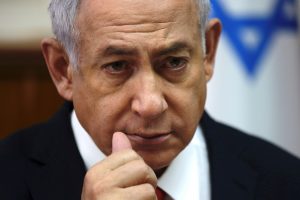
By Angus McDowall and Dan Williams
BEIRUT/JERUSALEM (Reuters) – Israel struck in Syria early on Monday, the latest salvo in its increasingly open assault on Iran’s presence there, shaking the night sky over Damascus with an hour of loud explosions in a second consecutive night of military action.
Damascus did not say what damage or casualties resulted from the strikes. The Syrian Observatory for Human Rights war monitor said 11 people were killed. Syria’s ally Russia said four Syrian soldiers had died and six were wounded.
Israeli Prime Minister Benjamin Netanyahu said the air raid had mostly targeted Iranian forces, but also hit Syrians helping them. “We will strike at anyone who tries to harm us,” he said.
The threat of direct confrontation between arch-enemies Israel and Iran has long simmered in Syria, where the Iranian military built a presence early in the nearly eight year civil war to help President Bashar al-Assad’s government.
Israel, regarding Iran as its biggest threat, has repeatedly attacked Iranian targets in Syria and those of allied militia, including Lebanon’s Hezbollah.
With an election approaching, Israel’s government has begun discussing its strikes more openly and has also taken a tougher stance towards Hezbollah on the border with Lebanon. It said a rocket attack on Sunday was Iran’s work.
The Israeli shift comes a month after U.S. President Donald Trump unexpectedly announced a sudden plan to pull the 2,000 U.S. troops from Syria, a move long sought by Assad and his Russian and Iranian allies. Trump’s decision shocked American allies in the region and was opposed by top U.S. officials including Defense Secretary Jim Mattis who quit in response.
The Israeli military said its fighter jets had attacked Iranian “Quds Force” targets early on Monday, including munition stores, a position in the Damascus International Airport, an intelligence site and a military training camp. Its jets then targeted Syrian defense batteries after coming under fire.
It followed a previous night of cross-border fire, which Israel said began when Iranian troops fired an Iranian-made surface-to-surface missile from an area near Damascus at a ski resort in the Israeli-occupied Golan Heights.
Syria said it was Israel that had attacked and its air defenses had repelled the assault. Syria had endured “intense attack through consecutive waves of guided missiles”, but had destroyed most “hostile targets”, state media quoted a military source as saying.
The Russian defense ministry said Syrian air defenses, supplied by Russia, had destroyed more than 30 cruise missiles and guided bombs, according to RIA news agency.
In Tehran, airforce chief Brigadier General Aziz Nasirzadeh said Iran was “fully ready and impatient to confront the Zionist regime and eliminate it from the earth”, according to the Young Journalist Club, a website supervised by state television.
Assad has said Iranian forces are welcome to stay in Syria after years of military victories that have brought most of the country back under his control. Just two big enclaves are still outside Assad’s grip, including the area Trump plans to exit.
Netanyahu, who is hoping to win a fifth term in the April 9 election, last week told his cabinet Israel has carried out “hundreds” of attacks over recent years.
“We have a permanent policy, to strike at the Iranian entrenchment in Syria and hurt whoever tries to hurt us,” he said on Sunday.
“EVERY LAST BOOT”
The Israeli military distributed footage of what it said were missiles hitting the Syrian defense batteries, as well as satellite images showing the location of the alleged Iranian targets. Syrian state media showed footage of explosions.
In a highly publicized operation last month, the Israeli military uncovered and destroyed cross-border tunnels from Lebanon it said were dug by Hezbollah to launch future attacks.
Israel last fought a war with Hezbollah, on Lebanese soil, in 2006. It fears Hezbollah has used its own role fighting alongside Iran and Assad in Syria to bolster its military capabilities, including an arsenal of rockets aimed at Israel.
Tensions have also risen with Israel’s construction of a frontier barrier that Lebanon says passes through its territory.
Washington has sought to reassure allies it still aims to eject Iran from Syria despite pulling its own troops out. U.S. Secretary of State Mike Pompeo, who visited the region this month, has vowed to expel “every last Iranian boot” from Syria.
Israel has sought reassurances from Moscow that Iranian forces in Syria would not be a threat. Israeli military spokesman Lieutenant Colonel Jonathan Conricus said the missile fired at the ski resort was launched from “an area we were promised the Iranians would not be present in”.
(Reporting by Ellen Francis in Beirut, Ari Rabinovitch and Dan Williams in Jerusalem and Maria Kiselyova in Moscow; writing by Angus McDowall; Editing by Nick Macfie and Raissa Kasolowsky)










